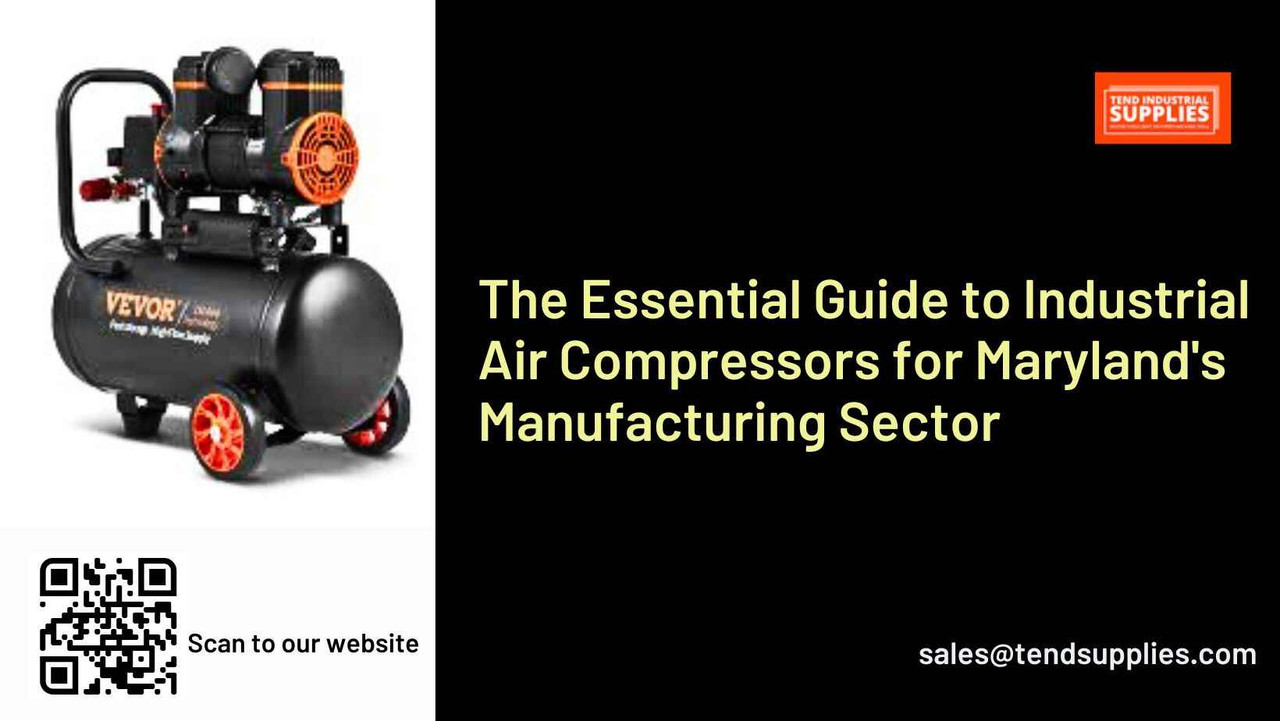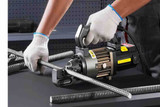The Essential Guide to Industrial Air Compressors for Maryland's Manufacturing Sector
In the heart of the Mid-Atlantic region, Maryland's manufacturing sector stands as a cornerstone of the state's economy. From aerospace and defense to food processing and biotechnology, the diverse range of industries relies heavily on efficient and reliable equipment to maintain their competitive edge. Among these critical tools, industrial air compressors play a pivotal role in powering various processes and machinery. This comprehensive guide delves into the world of industrial air compressors, tailored specifically for Maryland's manufacturing landscape, offering insights, recommendations, and expert advice to help businesses optimize their operations.
Key Takeaway
Investing in the right industrial air compressor can significantly boost productivity, reduce energy costs, and improve overall operational efficiency in Maryland's manufacturing facilities. By understanding the specific needs of your industry and choosing a compressor with the appropriate capacity, type, and features, manufacturers can ensure a reliable and efficient compressed air supply that meets the demands of their production processes.
Understanding Industrial Air Compressors
Industrial air compressors are the workhorses of the manufacturing sector, providing the compressed air necessary for powering pneumatic tools, operating machinery, and facilitating various manufacturing processes. In Maryland's diverse manufacturing landscape, the choice of air compressor can make a significant difference in operational efficiency and productivity.
Types of Industrial Air Compressors
- Reciprocating Compressors: Ideal for intermittent use and smaller operations.
- Rotary Screw Compressors: Suitable for continuous operation and larger facilities.
- Centrifugal Compressors: Best for very high-capacity needs in large industrial settings.
Key Factors to Consider
When selecting an industrial air compressor for your Maryland manufacturing facility, consider the following factors:
- Capacity: Measured in Cubic Feet per Minute (CFM), this determines the volume of air the compressor can deliver.
- Pressure: Measured in Pounds per Square Inch (PSI), this indicates the force at which the air is delivered.
- Duty Cycle: The ratio of on-time to off-time, crucial for determining if a compressor can handle your operational needs.
- Energy Efficiency: Look for energy-efficient models to reduce operational costs and environmental impact.
- Noise Level: Important for maintaining a comfortable work environment and complying with local regulations.
- Maintenance Requirements: Consider the long-term maintenance needs and associated costs.
Maryland's Manufacturing Landscape and Air Compressor Needs
Maryland's manufacturing sector is diverse, with several key industries that have unique compressed air requirements:
- Aerospace and Defense: High-precision pneumatic tools and testing equipment require reliable, clean air supply.
- Food Processing: Sanitary air compressors are essential for packaging, conveying, and process control.
- Pharmaceuticals and Biotechnology: Oil-free compressors are crucial to maintain product purity and comply with regulations.
- Chemical Manufacturing: Explosion-proof compressors may be necessary for handling volatile substances.
- Metal Fabrication: High-capacity compressors are needed to power various pneumatic tools and CNC machinery.
Industry-Specific Recommendations
| Industry | Recommended Compressor Type | Key Features |
| Aerospace | Rotary Screw (Oil-free) | High CFM, Precision air filtration |
| Food Processing | Scroll Compressor | Oil-free, Low noise, Energy efficient |
| Pharmaceuticals | Rotary Screw (Oil-free) | Class 0 air quality, Variable speed drive |
| Chemical Manufacturing | Reciprocating (Explosion-proof) | Robust design, Safety features |
| Metal Fabrication | Rotary Screw | High capacity, Durability |
Energy Efficiency and Cost Savings
In Maryland, where electricity costs can significantly impact operational expenses, choosing an energy-efficient air compressor is crucial. Here are some strategies to maximize energy efficiency:
- Variable Speed Drives (VSD): These adjust the compressor's output to match demand, reducing energy waste.
- Heat Recovery Systems: Capture and repurpose the heat generated by compressors for space heating or other processes.
- Regular Maintenance: Proper upkeep ensures the compressor operates at peak efficiency.
- Leak Detection and Repair: Implement a robust leak detection program to minimize air loss.
- Proper Sizing: Choose a compressor that matches your actual air demand to avoid inefficiencies from oversizing.
Potential Energy Savings
Implementing energy-efficient practices can lead to significant cost savings. For example:
- A 100 HP compressor operating 24/7 can consume approximately $74,000 in electricity annually.
- Implementing a VSD can reduce this cost by 20-50%, potentially saving $14,800 to $37,000 per year.
- Heat recovery can reclaim up to 90% of the compressor's input energy, further reducing overall energy costs.
Air Quality and Filtration
For many Maryland manufacturers, particularly those in aerospace, pharmaceuticals, and food processing, air quality is paramount. Proper filtration and treatment of compressed air ensure:
- Product quality and safety
- Compliance with industry regulations
- Protection of pneumatic equipment and tools
- Reduced maintenance costs
Air Quality Classes
The ISO 8573-1:2010 standard defines air quality classes:
| Class | Solid Particulate (μm) | Water (Pressure Dew Point) | Oil (mg/m³) |
| 1 | ≤ 0.1 | ≤ -70°C | ≤ 0.01 |
| 2 | ≤ 1 | ≤ -40°C | ≤ 0.1 |
| 3 | ≤ 5 | ≤ -20°C | ≤ 1 |
| 4 | ≤ 15 | ≤ +3°C | ≤ 5 |
Ensure your air treatment system meets the required class for your specific application.
Maintenance and Reliability
To keep your industrial air compressor running efficiently and extend its lifespan, follow these maintenance best practices:
- Regular Oil Changes: For oil-lubricated compressors, change the oil as per manufacturer recommendations.
- Air Filter Replacement: Clean or replace air filters regularly to maintain efficiency.
- Belt Tensioning: Check and adjust belt tension to prevent slippage and energy loss.
- Cooler Cleaning: Keep coolers clean to ensure proper heat dissipation.
- Moisture Drainage: Regularly drain moisture from the system to prevent corrosion and contamination.
- Leak Checks: Conduct periodic leak checks and repairs to minimize air loss.
Implementing a predictive maintenance program using IoT sensors and data analytics can help predict and prevent failures, reducing downtime and maintenance costs.
Compliance and Safety
Maryland manufacturers must adhere to various regulations regarding compressed air systems:
- OSHA Standards: Ensure compliance with safety standards for compressed air equipment.
- EPA Regulations: Be aware of any environmental regulations regarding emissions and energy use.
- Local Permits: Check with local authorities for any required permits or inspections.
Choosing the Right Supplier
When selecting an industrial air compressor supplier in Maryland, consider:
- Product Range: Ensure they offer compressors suitable for your specific industry and applications.
- Technical Support: Look for suppliers with strong technical knowledge and support capabilities.
- Maintenance Services: Consider suppliers offering comprehensive maintenance and repair services.
- Energy Audits: Some suppliers provide energy audits to help optimize your compressed air system.
- Warranty and After-Sales Support: Check the warranty terms and availability of parts and service.
Conclusion
Selecting the right industrial air compressor is crucial for the success and efficiency of Maryland's manufacturing operations. By considering factors such as capacity, energy efficiency, air quality, and maintenance requirements, manufacturers can ensure they have a reliable and cost-effective compressed air system that meets their specific needs.
Tend Industrial Supplies offers a wide range of industrial air compressors and related equipment tailored to the diverse needs of Maryland's manufacturing sector. Our team of experts can help you select the perfect compressor for your application, ensuring optimal performance and energy efficiency.
Visittendsupplies.com or contact sales@tendsupplies.com to explore our selection and receive personalized advice on choosing the best industrial air compressor for your Maryland manufacturing facility.
FAQs
Q: How often should I service my industrial air compressor?
A: Most manufacturers recommend a full service every 2,000-4,000 operating hours or annually, whichever comes first. However, daily and weekly checks should be performed as part of routine maintenance.
Q: Can I use a standard air compressor for food processing applications?
A: It's not recommended. Food processing requires oil-free, often Class 0 air compressors to prevent contamination. Specialized food-grade compressors are designed to meet strict hygiene standards.
Q: How can I determine the right size air compressor for my facility?
A: Conduct an air audit to measure your actual air demand. Calculate the total CFM required by all pneumatic tools and processes, then add 20-30% for future growth and to account for potential leaks.
Q: Are there any state incentives in Maryland for upgrading to energy-efficient air compressors?
A: Yes, Maryland offers various energy efficiency incentives through utility companies and state programs. Check with your local utility provider or the Maryland Energy Administration for current offers.
Q: How can I reduce noise from my industrial air compressor?
A: Consider installing the compressor in a separate, insulated room, using sound-dampening enclosures, installing intake silencers, and choosing compressor models designed for quiet operation.
Related Articles
- Understanding the Right Size of Air Compressor for Your Pneumatic Air Tools in 2023
- 15 Essential Pneumatic Tools Every Workshop Must Have
- The Ultimate Guide to Air Impact Wrenches: Reviews, Buying Guides, and Comparisons
- Best Air Compressors for Virginia's DIY Enthusiasts









